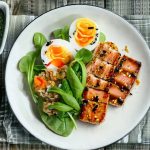Many individuals experience digestive discomfort – bloating, gas, sluggishness – after eating, even if they don’t have diagnosed digestive conditions. Often, this isn’t due to serious illness but rather the cumulative load placed on our digestive system by the quantity and complexity of foods we consume at once. Snacking, in particular, can contribute significantly to this burden, as quick, convenient options frequently prioritize taste over digestibility. Understanding how food impacts digestion and making mindful choices about snack composition is a powerful step towards improved gut health and overall wellbeing. It’s not always about eliminating entire food groups; it’s often about how we combine and prepare foods that makes the biggest difference.
The digestive process is remarkably complex, involving mechanical breakdown (chewing) and chemical digestion (enzymes breaking down nutrients). Certain foods are inherently easier to digest than others. Highly processed items, those high in fat content, or combinations of large quantities of different food groups require more effort from the digestive system. Minimizing the “digestive load” means choosing snacks that require less work for your body to process, allowing energy to be used elsewhere and reducing the likelihood of discomfort. This isn’t about restrictive dieting; it’s about intelligent snacking – selecting options that nourish you without overwhelming your system. If you struggle with this, exploring daily habits can be a great start.
Prioritizing Easily Digestible Foods
The cornerstone of minimizing digestive load is choosing foods that are naturally easy for the body to break down. These tend to be whole, unprocessed options with simple nutrient profiles. Fruits and vegetables, particularly cooked or softened varieties, fall into this category. Steamed or baked sweet potato, for example, is significantly easier to digest than a large portion of fried potatoes. Similarly, ripe bananas are generally well-tolerated, while unripe ones can be more difficult. Lean protein sources like boiled eggs or small portions of plain yogurt (if dairy is tolerated) are also good choices, as they provide essential nutrients without the heavy fat content often found in processed snacks. Focus on single-ingredient options whenever possible, reducing the complexity your digestive system needs to tackle. You might find it helpful to review foods that help restore pH balance as well.
Consider the impact of fiber – while crucial for gut health overall, excessive amounts can be challenging for some individuals. Soluble fiber (found in oats, applesauce, and bananas) is generally easier to digest than insoluble fiber (found in wheat bran and certain vegetables). It’s about finding a balance that works for your individual needs. Experiment with introducing different types of fiber slowly to assess tolerance levels. Remember that cooking vegetables often softens the fiber content, making them more digestible.
Finally, hydration plays a critical role. Drinking water alongside snacks aids in the digestive process and prevents constipation, which can exacerbate digestive discomfort. Dehydration forces the body to pull water from other sources during digestion, potentially leading to sluggishness and bloating. Staying adequately hydrated throughout the day is an essential component of any strategy aimed at minimizing digestive load.
Gentle Protein Sources for Snacking
Protein is vital for satiety and maintaining muscle mass, but certain protein sources are gentler on the digestive system than others. Red meat and processed meats can be difficult to digest due to their high fat content and complex protein structures. Instead, opt for:
- Boiled or poached eggs: Easily digestible and a great source of essential amino acids.
- Plain Greek yogurt (if tolerated): Offers probiotics which support gut health, but lactose sensitivity should be considered. Choose full-fat options if dairy is well-tolerated; fat aids in nutrient absorption.
- Small portions of fish: Lean white fish like cod or haddock are easier to digest than fatty fish.
- Tofu (soft or silken): A plant-based protein source that’s generally well-tolerated, especially when prepared simply.
Avoid combining large quantities of protein with high-fat foods, as this can slow down digestion and contribute to discomfort. Portion control is key – a small serving of protein paired with easily digestible carbohydrates (like a banana) is often more beneficial than a larger portion on its own. Consider how your body reacts to different sources; some individuals find legumes like lentils easier to digest after soaking them overnight. If you’re looking for ideas, check out easy-to-digest dinner options too.
The Role of Healthy Fats in Digestibility
While excessive fat can be difficult to process, healthy fats are essential for overall health and can actually aid digestion when consumed in moderation. Avocado is a prime example – its creamy texture and healthy monounsaturated fats provide sustained energy and support nutrient absorption. Similarly, small amounts of nut butter (almond or cashew) paired with fruit offer a satisfying snack that’s relatively easy to digest.
The key lies in choosing the right types of fat and avoiding fried foods and highly processed oils. Focus on:
1. Monounsaturated fats (avocado, olive oil).
2. Polyunsaturated fats (nuts, seeds, fatty fish – in moderation).
3. Avoiding trans fats altogether.
Pay attention to how your body responds to different types of nuts and seeds; some individuals may find certain varieties more digestible than others. Chia seeds, for example, require adequate hydration to prevent digestive upset. Remember that fat slows down digestion, so it’s best to combine it with other easily digestible foods rather than consuming large quantities on their own. It can be useful to understand common additives too, as these can impact fat processing.
Simple Carbohydrates & Gut Comfort
Carbohydrates are often unfairly demonized, but they play an important role in providing energy and supporting gut health. The issue isn’t carbohydrates themselves, but the type of carbohydrate consumed. Refined sugars and processed grains cause rapid spikes in blood sugar and can contribute to digestive discomfort. Instead, focus on simple carbohydrates from whole foods:
- Ripe bananas: Provide easily digestible sugars and potassium.
- Applesauce (unsweetened): A gentle source of fiber and pectin, which supports gut health.
- Cooked sweet potato: Offers complex carbohydrates and vitamin A in a readily digestible form.
- Oatmeal (plain, with minimal additions): Provides soluble fiber that promotes regularity.
Avoid combining large amounts of simple carbohydrates with high-fat foods, as this can exacerbate digestive issues. Portion control is crucial. For example, a small bowl of oatmeal with a few berries is a much better choice than a large serving with added sugar and butter. Listen to your body – some individuals may find certain fruits or vegetables more digestible than others. Taking small wins when making changes can help build consistency. If you’re planning breakfast, consider breakfast ideas that are reflux safe.
The information provided in this article is for general knowledge and informational purposes only, and does not constitute medical advice. It is essential to consult with a qualified healthcare professional for any health concerns or before making any decisions related to your health or treatment.


















